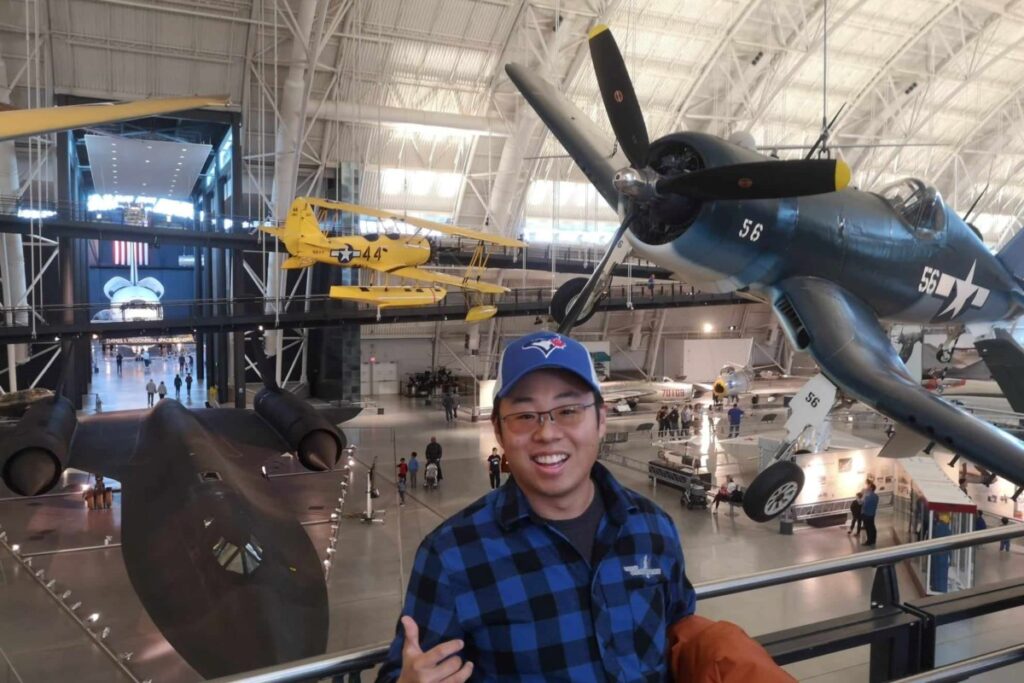At the beginning of May, I had the privilege of vacationing in Washington DC with my parents. Although I'm a US citizen, I'd never been to the nation's capital, so I was excited to finally visit. Call me weird, but spending a week in a bustling metropolis with skyscrapers and baseball stadiums was actually a very nice break from the hustle and bustle of Whistler.
Two Smithsonian National Air and Space Museums were at the top of my bucket list: the downtown flagship, which houses the Apollo 11 Command Module, and the Steven F. Udvar-Hazy Center, which houses the Space Shuttle Discovery and the SR-71 Blackbird. These places have been on my bucket list since I was a kid, and as John Turturro's character jokes in “Transformers: Revenge of the Fallen,” it's truly “a wonderland.”
As a quick aside, the Blackbird spy plane entered service in 1966 and could fly across the continental United States in 64 minutes – a fact that will always be remembered as amazing.
As I began helping my parents plan their trip, I quickly discovered a very pleasant surprise: the opportunity to visit many top-notch attractions, such as the Air and Space Museum and the National Museum of Natural History, for free.
Free? In capitalist empire America? Surely not?
Yes, that's right.
It was a memorable trip, where I spent dozens of hours looking at iconic planes, famous spaceships, dinosaur bones, and artifacts that tell the story of key moments in U.S. history. Soon after returning home, I began to wonder: Should museums charge admission? Wouldn't it be better for society if they didn't?
The (fun) pursuit of knowledge
If a museum were free, it would instantly become a more attractive destination. More people would consider stopping by, especially tourists and those without a strong interest in a particular subject. You no longer have to ask, “Is this place worth going to?” You can come, get bored, and leave in 15 minutes.
Meanwhile, a certain segment of the population (i.e. aerospace and paleontology nerds like me) will be soaking up a wealth of fascinating knowledge. These folks will return again and again with friends and family. The general public will inevitably be drawn in by their fellow nerds, some of whom will be impressed, further spreading the word about the exhibit through word of mouth.
This process ultimately creates a larger, more diverse community willing to support the museum financially and otherwise.
Moreover, the pursuit of knowledge is an inherently worthwhile endeavor. It should not be limited to flawed public school systems, expensive universities, or pay-to-play scientific journals.
The museum I visited last month was filled with hundreds of elementary and middle school students, many of them on out-of-state field trips, and while not all of them were particularly interested in blackbirds or T-Rex skeletons, all got the chance to discover a new passion or hone their trivia skills.
All of these kids got a chance to see something substantial instead of the bland, algorithm-driven boredom of social media.
Currently, all free museums in Washington DC are supported by the federal government. We understand that seeking additional government funding is not always feasible, especially in jurisdictions where public needs are more pressing. Every museum is different. The Odin Museum is not beholden to the Smithsonian Institution, so we need to generate revenue in other ways.
Either way, I believe museums are an important means of stimulating people's interest in learning. A good museum can be as informative as a school curriculum, but far more interesting. Accessible and sound public knowledge is a worthwhile investment, especially for the benefit of future generations in a world rife with misinformation and biased cultural priorities.
Personally, I'd much rather have my hypothetical son be passionate about supersonic jets, military history, sports, or art than be religiously devoted to video games, even though I love video games myself.
While it may be a pipe dream to have all North American museums be free, there may be a way to find a middle ground and lower admission fees to a more widely accessible level. I think this is a question worth asking.



